北师大版(2019)高中英语必修第三册 UnIt9Learning Lesson 1 Active Learning公开课课件(37张)
文档属性
| 名称 | 北师大版(2019)高中英语必修第三册 UnIt9Learning Lesson 1 Active Learning公开课课件(37张) |
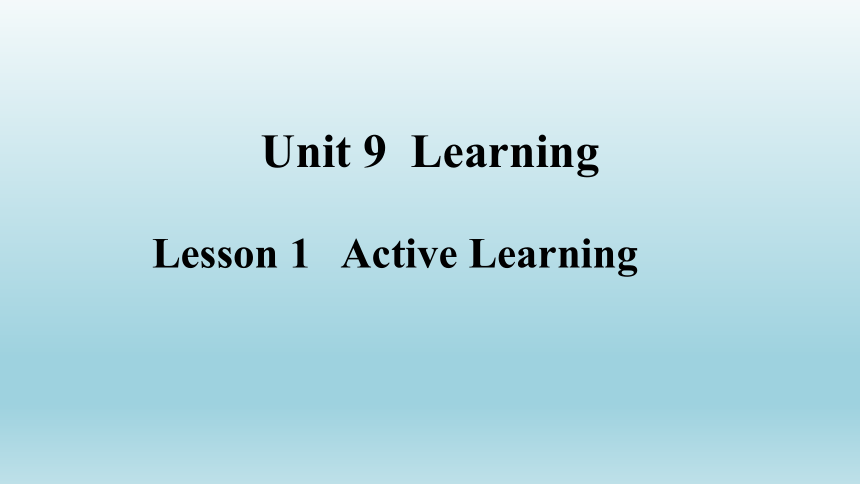
|
|
| 格式 | pptx | ||
| 文件大小 | 1.1MB | ||
| 资源类型 | 教案 | ||
| 版本资源 | 北师大版(2019) | ||
| 科目 | 英语 | ||
| 更新时间 | 2023-03-07 21:54:19 | ||
图片预览

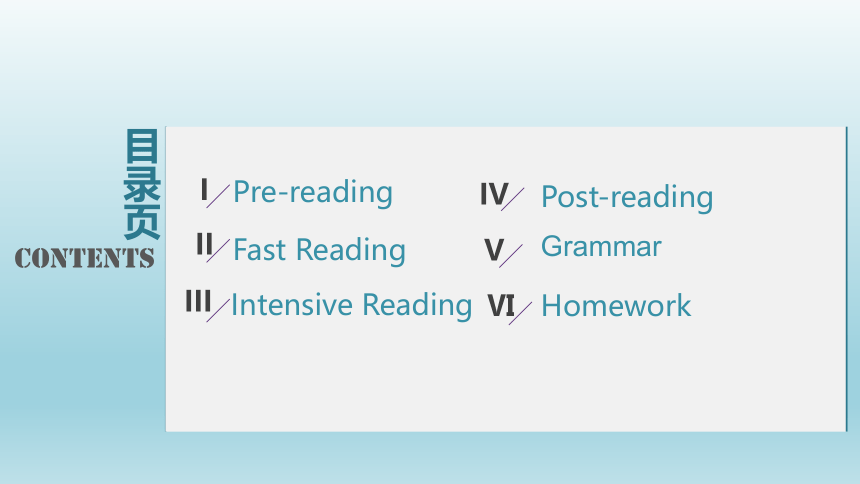
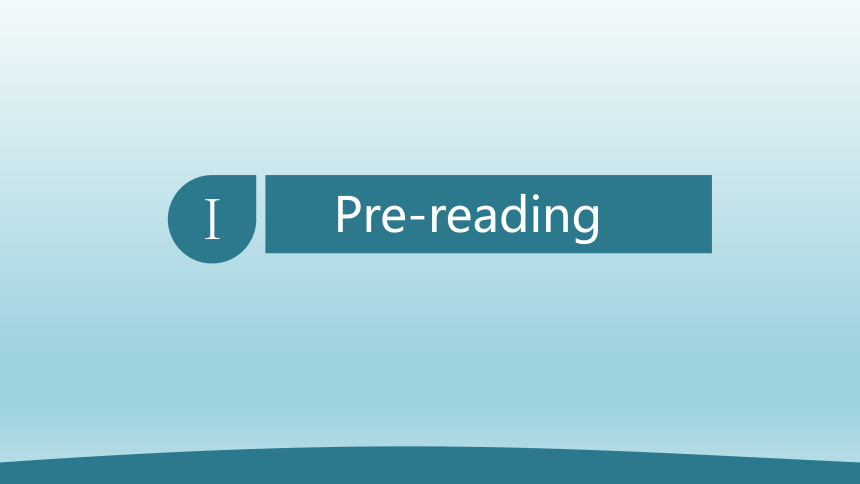
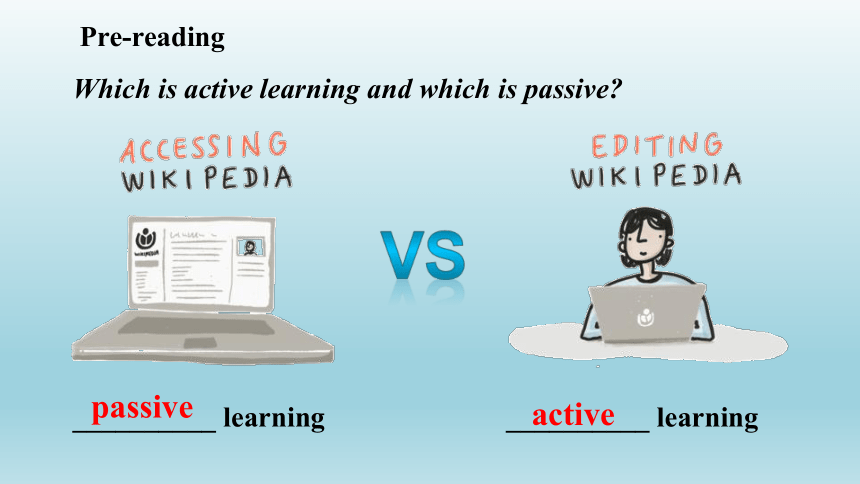
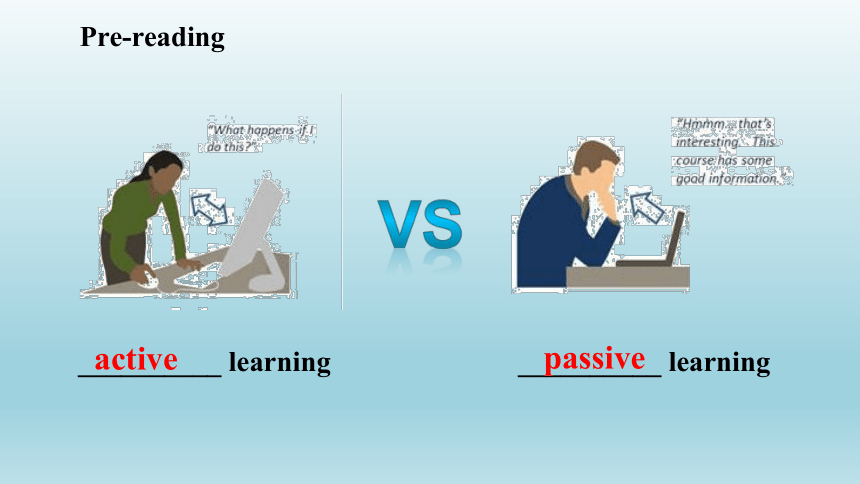
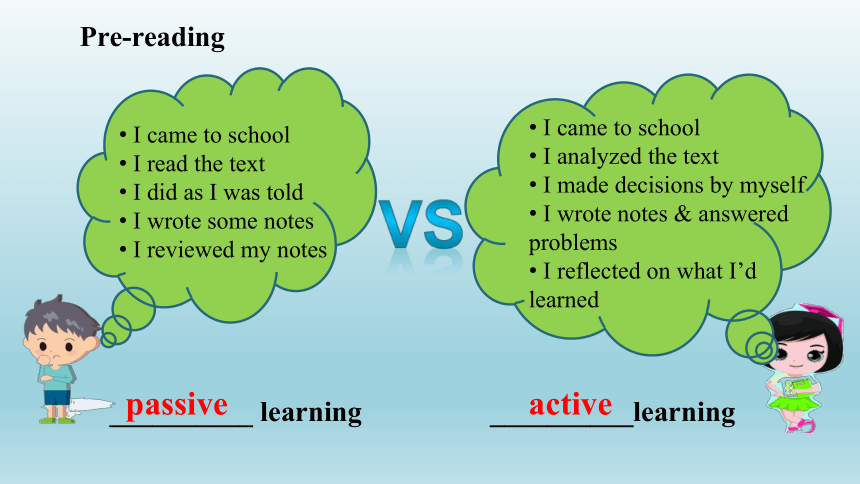
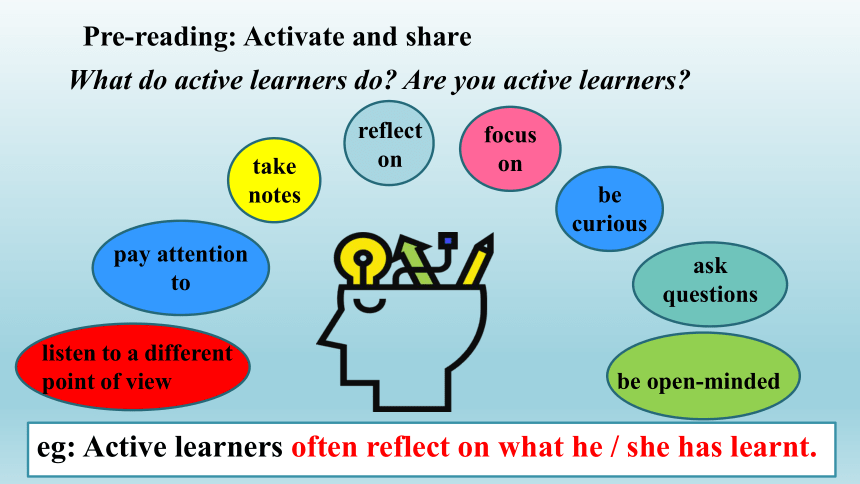
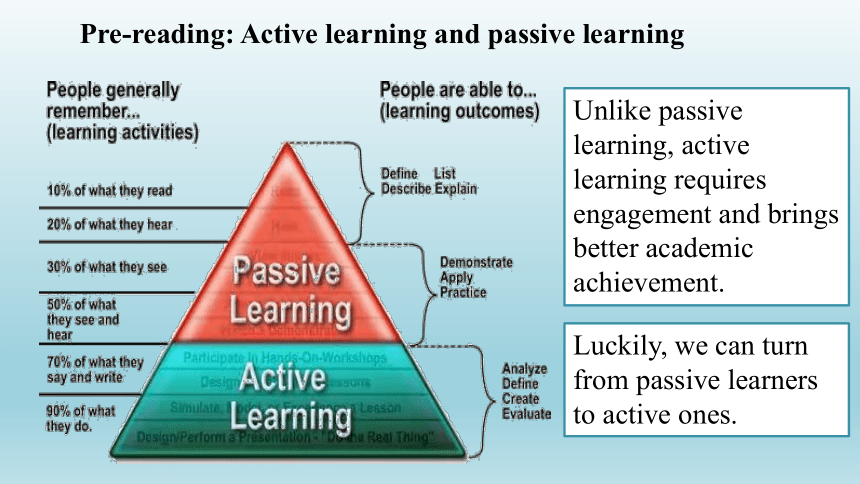
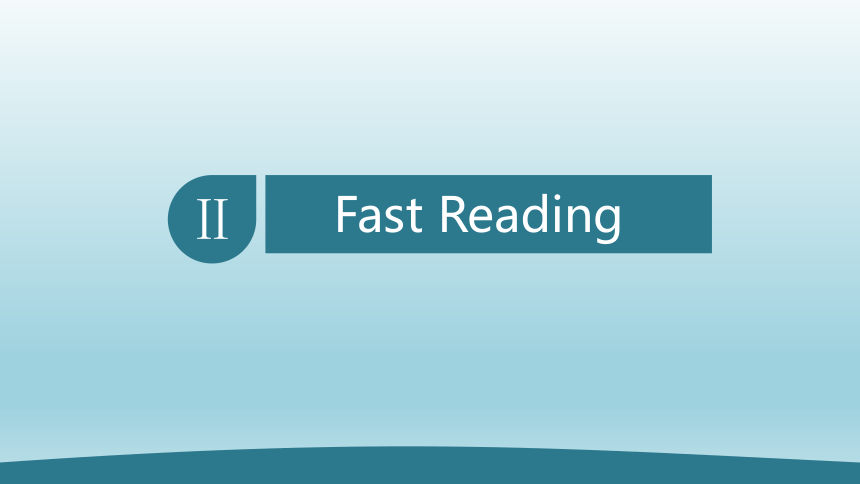
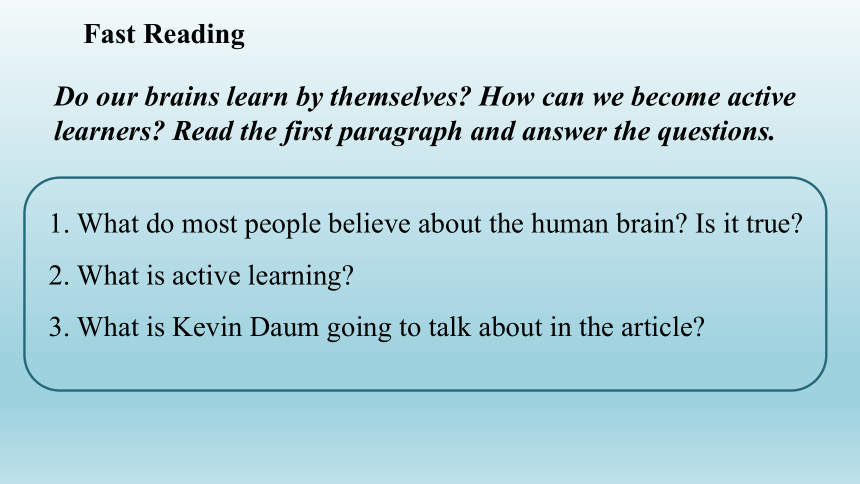
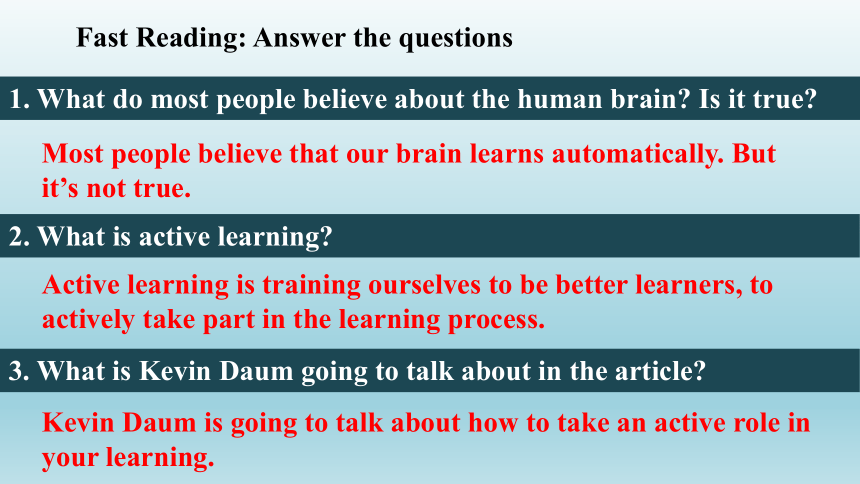
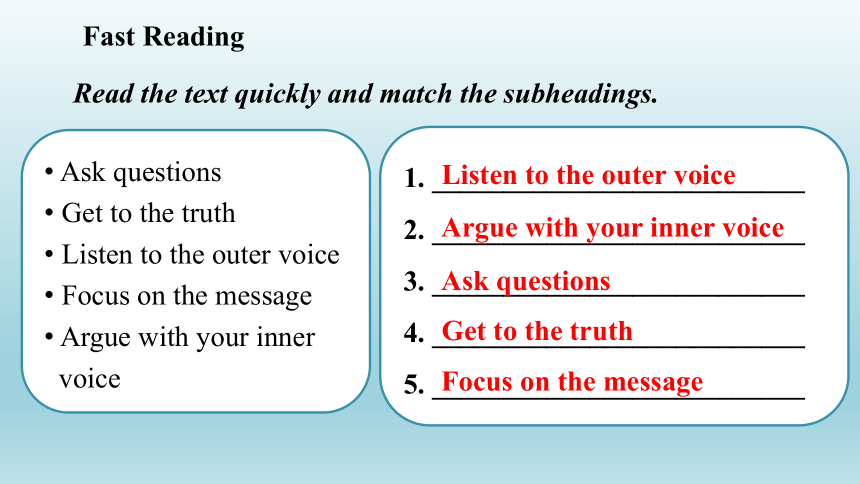
文档简介
(共37张PPT)
Unit 9 Learning
Lesson 1 Active Learning
目录页
contents
Pre-reading
I
Post-reading
IV
Fast Reading
II
Grammar
V
III
Intensive Reading
Ⅵ
Homework
Ⅰ
Pre-reading
Pre-reading
vs
__________ learning
__________ learning
active
passive
Which is active learning and which is passive
vs
__________ learning
__________ learning
active
passive
Pre-reading
vs
__________ learning
__________learning
I came to school
I analyzed the text
I made decisions by myself
I wrote notes & answered problems
I reflected on what I’d learned
I came to school
I read the text
I did as I was told
I wrote some notes
I reviewed my notes
active
passive
Pre-reading
Pre-reading: Activate and share
What do active learners do Are you active learners
eg: Active learners often reflect on what he / she has learnt.
reflect on
pay attention to
be open-minded
focus on
listen to a different point of view
ask questions
be curious
take notes
Pre-reading: Active learning and passive learning
Unlike passive learning, active learning requires engagement and brings better academic achievement.
Luckily, we can turn from passive learners to active ones.
Ⅱ
Fast Reading
Fast Reading
Do our brains learn by themselves How can we become active learners Read the first paragraph and answer the questions.
What do most people believe about the human brain Is it true
What is active learning
What is Kevin Daum going to talk about in the article
Fast Reading: Answer the questions
3. What is Kevin Daum going to talk about in the article
Most people believe that our brain learns automatically. But it’s not true.
Active learning is training ourselves to be better learners, to actively take part in the learning process.
Kevin Daum is going to talk about how to take an active role in your learning.
1. What do most people believe about the human brain Is it true
2. What is active learning
1. __________________________
2. __________________________
3. __________________________
4. __________________________
5. __________________________
Fast Reading
Ask questions
Get to the truth
Listen to the outer voice
Focus on the message
Argue with your inner
voice
Read the text quickly and match the subheadings.
Ask questions
Get to the truth
Focus on the message
Listen to the outer voice
Argue with your inner voice
Ⅲ
Intensive Reading
Intensive reading
Read every suggestion. Identify the learning actions, reasons and learning effects in the diagram.
1. Listen to the outer voice
Learning effects:
________________
Reasons:
________________
Learning actions:
________________
2. Argue with your inner voice
Reasons:
________________
Learning actions:
________________
Learning effects:
________________
Intensive reading
Read every suggestion. Identify the learning actions, reasons and learning effects in the diagram.
3. Ask questions
Reasons:
________________
Learning actions:
________________
Learning effects:
________________
Intensive reading
Read every suggestion. Identify the learning actions, reasons and learning effects in the diagram.
4. Get to the truth
Learning actions:
________________
Reasons:
________________
Learning effects:
________________
Intensive reading
Read every suggestion. Identify the learning actions, reasons and learning effects in the diagram.
5. Focus on the message
Reasons:
________________
Learning actions:
________________
Learning effects:
________________
Intensive reading
Read every suggestion. Identify the learning actions, reasons and learning effects in the diagram.
Ⅳ
Post-reading
Post-reading: Summary and retell
Each student chooses one suggestion and introduces it to others.
Active learning
(introduction Para. 1)
1. Listen to the outer voice (Para. 2)
2. Argue with your inner voice (Para. 3)
3. Ask questions
(Para. 4)
4. Get to the truth
(Para. 5)
5. Focus on the message
(Para. 6)
Which of the suggestions in the text do you think is the most useful for you Why
Example:
I think “arguing with your inner
voice” is the most useful, because
it makes me consider the other
side of an argument.
Post-reading: Speaking
Ⅴ
Grammar
There are many things we can do to become better learners. We all have two voices. Our inner voice tells us personal opinions and our outer voice deals with others’ opinions and things we have heard. If we listen to our inner voice too much, it can 1 block us from learning. If your inner voice is difficult to control, you can 2 disagree with it. One of the best ways to promote active learning is to ask questions.
In short based on at the heart of attempt to argue with
achieve a higher level of understanding get in the way of learning
get in the way of
argue with
Use the phrases below to replace the underlined parts.
Focus on Language: Important phrases
learning
This helps you 3 gain more knowledge about a topic. 4 In a word, we should never being curious. Active learners also 5 try to question the world around them and understand the truth 6 deep within every idea. Finally, as active learners, we should never form opinions about people 7 on the basis of first impressions.
achieve a higher level of understanding
In short
attempt to
at the heart of
based on
In short based on at the heart of attempt to argue with
achieve a higher level of understanding get in the way of learning
Focus on Language: Important phrases
Complete the sentences with the correct form.
1. It is difficult to ______ people who are having a heated _________.
2. I’m just _______ to know why you claim that aliens _________.
3. It’s better to ask than to _________ what people think.
4. The study is an _________ to get a better idea of why people live there.
5. The courses are _______ on a weekly two-hour class, extending over a period of 20 weeks.
argument attempt assume curious base exist ignore
ignore
argument
curious
exist
assume
attempt
based
Focus on Language: Important phrases
1. Be flexible in your opinions and you might end up agreeing with the speaker / writer after all.
祈使句 + and + 简单句:相当于if 引导的肯定的条件句
Use your head, and you will find a way.
= If you use your head, you will find a way.
祈使句 + or + 简单句:相当于if 引导的否定的条件句
Work hard, or you won’t pass the exam.
= If you don’t work hard, you won’t pass the exam.
灵活处理你的意见,你最终可能会同意说话人或者作者的观点。
Focus on Language: Important sentences
1. Give him an inch and he will take an ell.
译:_____________________________________
2. Grasp the needle and it won’t sting you.
译:_____________________________________
3. Respect yourself, _____ no one will respect you.
4. ______ (give) me one more hour, and you’ll get the work finished.
5. People want to do better, but they end up ______ (do) worse.
得寸进尺。
你不怕困难,困难就怕你。
Give
or
doing
Focus on Language: Exercise
2. If you try to find out the source of an idea, no matter how crazy it seems, you will increase your chance of learning something.
如果你试图找出一个想法的来源,无论这个想法看来多么不可思议,你都更有机会学到一些东西。
该句中 if 引导条件状语从句,主将从现; 引导条件状语从句的还有:as long as, provided that, suppose that, on condition that 等。
no matter how 引导让步状语从句,可替换为 however;no matter + 特殊疑问词可引导让步状语从句。
Focus on Language: Important sentences
1. If the president agrees, we _________ (start) our project.
2. _________ (provide) that there is no opposition, we shall hold the meeting here.
3. No matter how hard he tried, she could not change her mind.
译:_________________________________________
4. He won’t listen ________________________ you may say.
will start
Provided
whatever / no matter what
不管他多么努力,她都坚持己见。
Focus on Language: Exercise
Look at the colored verbs in the plete the table.
Verb + verb-ing form Verb + infinitive
suggest, need,
keep, risk, end up, stop, try, cannot help
attempt, try, refuse
Focus on Grammar: Verbs followed by Verb-ing Form or infinitive
Verb + verb-ing form Verb + infinitive
suggest, need,
keep, risk, end up, try, cannot help
advise, avoid, can’t stand, don’t mind, enjoy, start, like, practise, regret, remember
attempt, try, refuse
agree, start, help, like, manage, regret, seem, remember
Add the following verbs to the table above. Use a dictionary to help you.
advise agree avoid can’t stand don’t mind enjoy start
help like manage practise regret seem remember
Focus on Grammar: Verbs followed by Verb-ing Form or infinitive
注意以下动词:既加 to do 也加 doing
1
begin
start
continue
无区别
2
like
love
hate
prefer
区别微:
一次 / 经常
3
remember
forget
regret
区别大:
未做 / 做过
4
try
mean
stop
can’t help区别大
Focus on Grammar: Verbs followed by Verb-ing Form or infinitive
1. She tried _________ (read), but couldn’t make her forget her trouble.
2. He forgot even ________ (write) to me, so he wrote another one.
3. I regret ________ (tell) that we can’t take your advice.
4. Revolution means ____________ (liberate) the productive forces.
reading
writing
to tell
liberating
Focus on Grammar: Exercise 1
Recently, I’ve managed 1 __________ (become) a more active learner. When I’m reading a book or listening to my teacher, I try 2 _________ (forget) what I’ve learnt before or what I think about the book or the person giving me the information and practice 3 _____________ (concentrate) on the information itself. At the beginning, I found it difficult to do this and I couldn’t help
to become
to forget
concentrating
Focus on Grammar: Exercise 2
4 ___________ (question) the ideas I was reading or hearing. But now I’ve learnt to avoid 5 _________ (listen) to my inner voice all the time and sometimes I even argue with it. On the other hand, I also attempt 6 ______ (ask) as many questions as I can. I ask my teachers a lot of questions and I’ve noticed that the answers to the questions have really helped me understand the topic a lot better.
questioning
listening
to ask
Focus on Grammar: Exercise
VI
Homework
How will you learn actively in the future Make a list and explain pare and discuss your list with your group members.
Homework
Unit 9 Learning
Lesson 1 Active Learning
目录页
contents
Pre-reading
I
Post-reading
IV
Fast Reading
II
Grammar
V
III
Intensive Reading
Ⅵ
Homework
Ⅰ
Pre-reading
Pre-reading
vs
__________ learning
__________ learning
active
passive
Which is active learning and which is passive
vs
__________ learning
__________ learning
active
passive
Pre-reading
vs
__________ learning
__________learning
I came to school
I analyzed the text
I made decisions by myself
I wrote notes & answered problems
I reflected on what I’d learned
I came to school
I read the text
I did as I was told
I wrote some notes
I reviewed my notes
active
passive
Pre-reading
Pre-reading: Activate and share
What do active learners do Are you active learners
eg: Active learners often reflect on what he / she has learnt.
reflect on
pay attention to
be open-minded
focus on
listen to a different point of view
ask questions
be curious
take notes
Pre-reading: Active learning and passive learning
Unlike passive learning, active learning requires engagement and brings better academic achievement.
Luckily, we can turn from passive learners to active ones.
Ⅱ
Fast Reading
Fast Reading
Do our brains learn by themselves How can we become active learners Read the first paragraph and answer the questions.
What do most people believe about the human brain Is it true
What is active learning
What is Kevin Daum going to talk about in the article
Fast Reading: Answer the questions
3. What is Kevin Daum going to talk about in the article
Most people believe that our brain learns automatically. But it’s not true.
Active learning is training ourselves to be better learners, to actively take part in the learning process.
Kevin Daum is going to talk about how to take an active role in your learning.
1. What do most people believe about the human brain Is it true
2. What is active learning
1. __________________________
2. __________________________
3. __________________________
4. __________________________
5. __________________________
Fast Reading
Ask questions
Get to the truth
Listen to the outer voice
Focus on the message
Argue with your inner
voice
Read the text quickly and match the subheadings.
Ask questions
Get to the truth
Focus on the message
Listen to the outer voice
Argue with your inner voice
Ⅲ
Intensive Reading
Intensive reading
Read every suggestion. Identify the learning actions, reasons and learning effects in the diagram.
1. Listen to the outer voice
Learning effects:
________________
Reasons:
________________
Learning actions:
________________
2. Argue with your inner voice
Reasons:
________________
Learning actions:
________________
Learning effects:
________________
Intensive reading
Read every suggestion. Identify the learning actions, reasons and learning effects in the diagram.
3. Ask questions
Reasons:
________________
Learning actions:
________________
Learning effects:
________________
Intensive reading
Read every suggestion. Identify the learning actions, reasons and learning effects in the diagram.
4. Get to the truth
Learning actions:
________________
Reasons:
________________
Learning effects:
________________
Intensive reading
Read every suggestion. Identify the learning actions, reasons and learning effects in the diagram.
5. Focus on the message
Reasons:
________________
Learning actions:
________________
Learning effects:
________________
Intensive reading
Read every suggestion. Identify the learning actions, reasons and learning effects in the diagram.
Ⅳ
Post-reading
Post-reading: Summary and retell
Each student chooses one suggestion and introduces it to others.
Active learning
(introduction Para. 1)
1. Listen to the outer voice (Para. 2)
2. Argue with your inner voice (Para. 3)
3. Ask questions
(Para. 4)
4. Get to the truth
(Para. 5)
5. Focus on the message
(Para. 6)
Which of the suggestions in the text do you think is the most useful for you Why
Example:
I think “arguing with your inner
voice” is the most useful, because
it makes me consider the other
side of an argument.
Post-reading: Speaking
Ⅴ
Grammar
There are many things we can do to become better learners. We all have two voices. Our inner voice tells us personal opinions and our outer voice deals with others’ opinions and things we have heard. If we listen to our inner voice too much, it can 1 block us from learning. If your inner voice is difficult to control, you can 2 disagree with it. One of the best ways to promote active learning is to ask questions.
In short based on at the heart of attempt to argue with
achieve a higher level of understanding get in the way of learning
get in the way of
argue with
Use the phrases below to replace the underlined parts.
Focus on Language: Important phrases
learning
This helps you 3 gain more knowledge about a topic. 4 In a word, we should never being curious. Active learners also 5 try to question the world around them and understand the truth 6 deep within every idea. Finally, as active learners, we should never form opinions about people 7 on the basis of first impressions.
achieve a higher level of understanding
In short
attempt to
at the heart of
based on
In short based on at the heart of attempt to argue with
achieve a higher level of understanding get in the way of learning
Focus on Language: Important phrases
Complete the sentences with the correct form.
1. It is difficult to ______ people who are having a heated _________.
2. I’m just _______ to know why you claim that aliens _________.
3. It’s better to ask than to _________ what people think.
4. The study is an _________ to get a better idea of why people live there.
5. The courses are _______ on a weekly two-hour class, extending over a period of 20 weeks.
argument attempt assume curious base exist ignore
ignore
argument
curious
exist
assume
attempt
based
Focus on Language: Important phrases
1. Be flexible in your opinions and you might end up agreeing with the speaker / writer after all.
祈使句 + and + 简单句:相当于if 引导的肯定的条件句
Use your head, and you will find a way.
= If you use your head, you will find a way.
祈使句 + or + 简单句:相当于if 引导的否定的条件句
Work hard, or you won’t pass the exam.
= If you don’t work hard, you won’t pass the exam.
灵活处理你的意见,你最终可能会同意说话人或者作者的观点。
Focus on Language: Important sentences
1. Give him an inch and he will take an ell.
译:_____________________________________
2. Grasp the needle and it won’t sting you.
译:_____________________________________
3. Respect yourself, _____ no one will respect you.
4. ______ (give) me one more hour, and you’ll get the work finished.
5. People want to do better, but they end up ______ (do) worse.
得寸进尺。
你不怕困难,困难就怕你。
Give
or
doing
Focus on Language: Exercise
2. If you try to find out the source of an idea, no matter how crazy it seems, you will increase your chance of learning something.
如果你试图找出一个想法的来源,无论这个想法看来多么不可思议,你都更有机会学到一些东西。
该句中 if 引导条件状语从句,主将从现; 引导条件状语从句的还有:as long as, provided that, suppose that, on condition that 等。
no matter how 引导让步状语从句,可替换为 however;no matter + 特殊疑问词可引导让步状语从句。
Focus on Language: Important sentences
1. If the president agrees, we _________ (start) our project.
2. _________ (provide) that there is no opposition, we shall hold the meeting here.
3. No matter how hard he tried, she could not change her mind.
译:_________________________________________
4. He won’t listen ________________________ you may say.
will start
Provided
whatever / no matter what
不管他多么努力,她都坚持己见。
Focus on Language: Exercise
Look at the colored verbs in the plete the table.
Verb + verb-ing form Verb + infinitive
suggest, need,
keep, risk, end up, stop, try, cannot help
attempt, try, refuse
Focus on Grammar: Verbs followed by Verb-ing Form or infinitive
Verb + verb-ing form Verb + infinitive
suggest, need,
keep, risk, end up, try, cannot help
advise, avoid, can’t stand, don’t mind, enjoy, start, like, practise, regret, remember
attempt, try, refuse
agree, start, help, like, manage, regret, seem, remember
Add the following verbs to the table above. Use a dictionary to help you.
advise agree avoid can’t stand don’t mind enjoy start
help like manage practise regret seem remember
Focus on Grammar: Verbs followed by Verb-ing Form or infinitive
注意以下动词:既加 to do 也加 doing
1
begin
start
continue
无区别
2
like
love
hate
prefer
区别微:
一次 / 经常
3
remember
forget
regret
区别大:
未做 / 做过
4
try
mean
stop
can’t help区别大
Focus on Grammar: Verbs followed by Verb-ing Form or infinitive
1. She tried _________ (read), but couldn’t make her forget her trouble.
2. He forgot even ________ (write) to me, so he wrote another one.
3. I regret ________ (tell) that we can’t take your advice.
4. Revolution means ____________ (liberate) the productive forces.
reading
writing
to tell
liberating
Focus on Grammar: Exercise 1
Recently, I’ve managed 1 __________ (become) a more active learner. When I’m reading a book or listening to my teacher, I try 2 _________ (forget) what I’ve learnt before or what I think about the book or the person giving me the information and practice 3 _____________ (concentrate) on the information itself. At the beginning, I found it difficult to do this and I couldn’t help
to become
to forget
concentrating
Focus on Grammar: Exercise 2
4 ___________ (question) the ideas I was reading or hearing. But now I’ve learnt to avoid 5 _________ (listen) to my inner voice all the time and sometimes I even argue with it. On the other hand, I also attempt 6 ______ (ask) as many questions as I can. I ask my teachers a lot of questions and I’ve noticed that the answers to the questions have really helped me understand the topic a lot better.
questioning
listening
to ask
Focus on Grammar: Exercise
VI
Homework
How will you learn actively in the future Make a list and explain pare and discuss your list with your group members.
Homework
同课章节目录
- Unit 7 Art
- Lesson 1 Masterpieces
- Lesson 2 Beijing Opera
- Lesson 3 A Musical Genius
- Unit 8 Green living
- Lesson 1 Roots and Shoots
- Lesson 2 Greening the Desert
- Lesson 3 "White Bikes" on the Road
- Unit 9 Learning
- Lesson 1 Active Learning
- Lesson 2 Language Learning Tips
- Lesson 3 The Secrets of Your Memory
